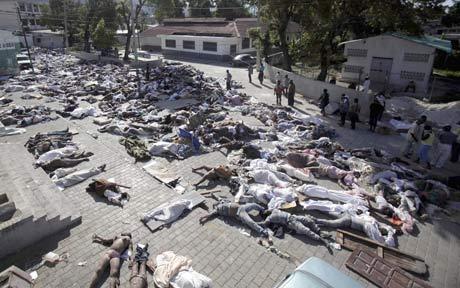Infectious Disease Risks from Dead Bodies Following Natural Disasters (pdf)
Oliver Morgan, Pan American Journal of Public Health, 2004;15(5):307–12.
In the wake of the deaths from the Haiti Earthquate — 200,000 at the most recent estimate — officials are struggling to provide appropriate and respectful body disposal. In an earlier post John mentioned the common misconception that dead bodies carry disease. Bodies are especially horrific in such quantities and conditions, with the persistent and inescapable smell of death. The otherwise natural inclination to mourn and respect the dead is overpowered by the sense of urgency to obliterate the reminder and ongoing reality of this collective trauma.
Enter mass graves: a “solution” that offers out of sight, out of mind — but little by way of preventing disease, as it’s not actually a legitimate threat to public health. A 2004 literature review (linked above) from the Pan American Health Organization on the management of dead bodies in disaster situations available offers some insight:
Victims of natural disasters usually die from trauma and are unlikely to have acute or “epidemic-causing” infections. This indicates that the risk that dead bodies pose for the public is extremely small. However, persons who are involved in close contact with the dead — such as military personnel, rescue workers, volunteers, and others — may be exposed to chronic infectious hazards, including hepatitis B virus, hepatitis C virus, HIV, enteric pathogens, and Mycobacterium tuberculosis. Suitable precautions for these persons include training, use of body bags and disposable gloves, good hygiene practice, and vaccination for hepatitis B and tuberculosis. Disposal of bodies should respect local custom and practice where possible. …
Concern that dead bodies are infectious can be considered a “natural” reaction by persons wanting to protect themselves from disease. However, clear information about the risks is needed so that responsible local authorities ensure that the bodies of disaster victims are handled appropriately and with due respect.
An editorial in the same journal issue (“Epidemics Caused by Dead Bodies: a Disaster Myth That Does Not Want to Die”) argues that expedient mass burial does have an effect on public health — not by preventing disease, but by exacerbating grief and endangering mental health:
Denying the right to identify the deceased or suppressing the means to track the body for proper grieving adds to the mental health risks facing the affected population.
It’s hard to say what has a worse impact over time: being surrounded by unburied, dead strangers for an extended period, or never being able to find the body of a deceased loved one. I’m willing to bet the latter.
